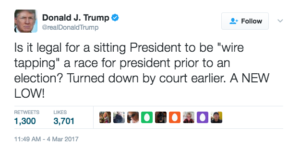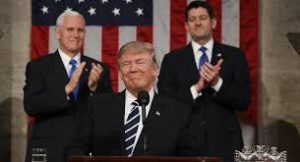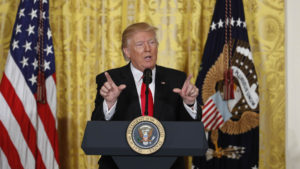
Typically, a straw man argument is some kind of misrepresentation (by selection, by distortion, or by invention) in order to conclude that some alternative position is stronger by comparison. We often think that last part–that some alternative position is stronger–is the key move. You use a straw man to go somewhere else with the argument.
So, for instance, “the Affordable Care Act (ACA or Obamacare) is communism,” distorts the ACA in favor of a more sensible, non-communist version.
This morning I was struck by an account of a strategic use of distortion that skips the last, crucial step in straw manning: the sensible alternative. Here it is:
1. Present distorted version of status quo.
2. Create crisis over distorted version of status quo.
3. Restore status quo (often at substantial cost).
4. Take credit for status quo.
(See also: North Korea.)https://t.co/9ijyuRJFza pic.twitter.com/LgdjVRrGUu— Brendan Nyhan (@BrendanNyhan) July 26, 2018
For context, this self-retweet is meant to characterize President Trump’s approach to revisions (rather, alleged revisions) to the North American Free Trade Agreement (NAFTA). The argument runs: NAFTA is bad (for exaggerated reasons), engage in a lengthy back-and-forth, NAFTA is fixed (when it’s the same).
You can see from the example that the distortion is almost entirely self-enclosed. In the first stage, it presents a distorted account of the current realty. So far, that’s very straw manny. But, rather than offering an allegedly more sensible alternative, it offers a second distortion, which takes us back to a non-distorted version of the status quo.
This version–I don’t know what to call it–retains all of the puffery of the standard versions: look at how dumb my opponents are! And it doubles that puffery by turning the exchange entirely into a show about how awesome you are. You’re not as awesome if you have to share the credit with someone else.
Perhaps the more precise account is this: you distort an interlocutor’s position so that you can occupy the non-distorted version. So, the alternative position is strong enough as it is. The only problem is who is occupying it–not you. You have to steal it. To do that, you have to trick your opponent into leaving it.
There are some natural advantages to this. It’s easier to occupy an already constructed position than to make up a new one. Just ask the Great Horned Owl. There’s got to be a real estate version of this scam. The closest I can find is the real estate practice of blockbusting, where unscrupulous developers scarred white people out of their homes in order to resell them at much higher prices to black families.




